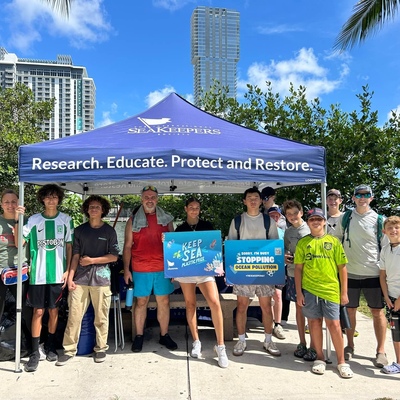Monthly Margaret Pace Cleanup
Miami, Florida
September 8, 2024
Overview
On the morning of September 8th, 2024, The International SeaKeepers Society hosted our monthly cleanup at Margaret Pace Park in downtown Miami. We were joined by 36 volunteers who met with us for a quick instructional and safety briefing before grabbing their gear and setting out to look for garbage. It had been some time since SeaKeepers last made a trip out to Margaret Pace, so we were hopeful that our team of volunteers could make a large impact on the state of the park. During the cleanup, our volunteers were also able to collect data to be shared with scientists and lawmakers reflecting the most common types of trash found through the use of the citizen science app Marine Debris Tracker. In just two short hours, our hardworking group of volunteers was able to remove more than 252 pounds of total trash, ranging from tiny bottle caps and microplastics to entire backpacks and shoes. Most of this debris was removed from the waterline, where it may be on its way into Biscayne Bay, or it may have washed up as marine debris from the nearby picnic islands. By removing trash from our coastlines, we can take steps to protect the water quality of Biscayne Bay and protect our resident dolphins, seabirds and manatees from suffering at the hands of marine debris. We give a huge thanks to all of our volunteers for joining us and for their incredible work, and look forward to seeing them at events in the future!
Marine Debris Tracker is a data collection app that allows the general public to contribute to an open-date platform and scientific research by recording the different types of litter, specifically plastic pollution, that they find in either inland or marine environments. Marine Debris Tracker was developed by the University of Georgia’s Jambeck Research Group, which SeaKeepers worked with in 2021 when the Jambeck Research Group collaborated with Ocean Conservancy to assess Miami’s plastic waste management, known as a Circularity Assessment Protocol. SeaKeepers again assisted the Jambeck Research Group’s Circularity Informatics Lab in 2022 with another Circularity Assessment Protocol in the Florida Keys. The researchers of the Jambeck Lab use the Marine Debris Tracker app to record their data, and with citizen scientists also using the app, more data can be collected in different areas. Using Marine Debris Tracker at our cleanups involves community members in creating a bigger picture of plastic pollution, and provides the means for new scientific findings to be generated as well as for effective local legislation to be informed. SeaKeepers is excited to be incorporating this app at our cleanups and continue our mission of coastal education, protection, and restoration. In this cleanup, 25% of volunteers participated in using the app to record data.


You must be logged in to post a comment.